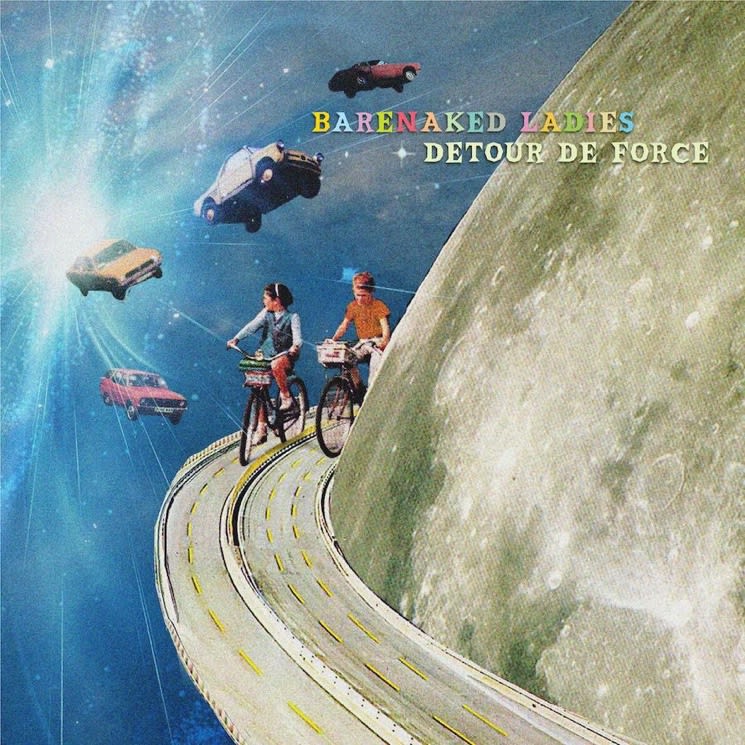Barenaked Ladies: a venerated Canadian institution. A group of scrappy Scarborough pop culture nerds who — through wit, skill and unrestrained chutzpah — became globetrotting, record-shattering Canadian Hall of Fame inductees. A band that have released dozens of heady, heartful and provocative hits, fusing pop and rock with nearly every other genre along the way. Balancing feeling and fun, BNL have managed to attract and sustain an intergenerational audience for over three decades.
So, now that "It's All Been Done," what's next?
For several years now, the answer has been a resounding 'stay the course.' Since former songwriter and lead singer Steven Page's departure in 2009 (and, arguably, for several years prior), the band has gotten used to putting out straight-ahead pop-rock albums every couple of years and touring incessantly. BNL's songwriting has still managed to occasionally provoke and intrigue, and the band's commitment to genre exploration has persisted — but it's become harder and harder to muster up enthusiasm for a new release. A new chapter in this iconic band's existence feels overdue.
This is why Barenaked Ladies' 16th studio album, Detour de Force — while taking some interesting thematic turns, and delivering some of the band's catchiest hooks in decades — reads as an unrealized opportunity to pivot, take some serious risks, and reclaim their title as one of Canada's most irresistibly unpredictable rock bands. When bandleader Ed Roberson sings "Take another trip / See another side of the same ship" on album opener and standout single "Flip," it feels like he's describing the album's unrealized goal. This is a collection of songs that wink at what previously made this band great and hint at some interesting paths forward, but ultimately declare that BNL have simply become unrequired listening.
This isn't to say that Detour de Force fails to showcase anything new. The themes of this album are prescient: the proliferation of fake news, the perils of the climate crisis, and the desire for a safe home and a healthy family in our increasingly unlivable world. The perspectives on these themes vary considerably, ranging from the apocalyptic tone of "New Disaster," which condemns the 24-hour news cycle and social media's impact on our mental health, to the tongue-in-cheek "Flat Earth," relaying Robertson's unexpected encounter with a real-life flat-Earther.
However, the potency of these themes is distilled by the sheer length of the album, and often suffers when Robertson is not in the driver's seat. Though bassist Jim Creeggan's meanderings are always affable (epitomized by "Paul Chambers," a jazzy ode to the legendary bassist that is both pleasant and instantly forgettable) and pianist Kevin Hearn's meditations usually provide some fresh air (the soundscape-y piano ballad "The National Park" does just that), these band members' greatest contributions are made through their instruments rather than their songwriting. Listening to their contributions often feels like watching clouds when what you'd really prefer is a bucket of water.
Though it is Robertson's writing that provides Detour de Force with several moments of wit and profundity, it seems that he's also comfortable showcasing fluff. Take the Shania Twain-tinged "Roll Out," for instance, featuring the hook "We're gonna kill it till the sun comes up." Moments of sheer joy can be delightful, but there's always an opportunity to infuse some meaning into the nonsense. Earlier in the album, Roberson does this masterfully on "Flip," twisting the kids' rhyme "this is the church / this is the steeple" into a commentary on a lack of nuance in our contemporary media landscape. Parading fun and nonsense while delivering an underlying message has always been a hallmark of BNL's music (read: "One Week," "Pinch Me," "If I Had $1,000,000"), and though Detour de Force features this proclivity at a couple turns, it feels more like a nostalgia trip than a return to form.
For all of Detour de Force's enthusiasm and variety, it can't seem to shake the central issue of BNL's post-Page albums: a flattened sonic palette that just doesn't push boundaries the way it used to. One of the inceptual joys of Barenaked Ladies was the fact that their biggest radio hits sounded like nothing else in the zeitgeist ("One Week," "Pinch Me," "If I Had $1,000,000"). Now, this quartet seems amiable to bending their sound towards flavourless pop-rock production trends (as the car commercial-ready chorus of "Good Life" attests), rather than allowing it to stand on its own merits.
The moments in which Barenaked Ladies do, to their credit, try to push their sound and substance in new directions provide mixed results. Though the album's final track, "Internal Dynamo," brings in trumpeter Michael Ray (of the Sun Ra Arkestra), this interesting collaboration does nothing to rescue this track, which squeezes a School of Rock-esque breakdown between robotic, new age-y meanderings.
On the other side of the coin, Detour de Force's understated highlight is "Man Made Lake," a tender reflection on humans' influence in shaping the natural world that was co-written by Robertson and Donovan Woods (and also featured on Woods' 2020 album Without People). Such a thoughtful collaboration with an emerging voice in Canadian folk music offers some hope. More collaborations like this could steer the band out of the habits they've fallen into, and perhaps allow them to truly "see another side of the same ship."
For the time being, 'steady as she goes.'
(Raisin' Records)So, now that "It's All Been Done," what's next?
For several years now, the answer has been a resounding 'stay the course.' Since former songwriter and lead singer Steven Page's departure in 2009 (and, arguably, for several years prior), the band has gotten used to putting out straight-ahead pop-rock albums every couple of years and touring incessantly. BNL's songwriting has still managed to occasionally provoke and intrigue, and the band's commitment to genre exploration has persisted — but it's become harder and harder to muster up enthusiasm for a new release. A new chapter in this iconic band's existence feels overdue.
This is why Barenaked Ladies' 16th studio album, Detour de Force — while taking some interesting thematic turns, and delivering some of the band's catchiest hooks in decades — reads as an unrealized opportunity to pivot, take some serious risks, and reclaim their title as one of Canada's most irresistibly unpredictable rock bands. When bandleader Ed Roberson sings "Take another trip / See another side of the same ship" on album opener and standout single "Flip," it feels like he's describing the album's unrealized goal. This is a collection of songs that wink at what previously made this band great and hint at some interesting paths forward, but ultimately declare that BNL have simply become unrequired listening.
This isn't to say that Detour de Force fails to showcase anything new. The themes of this album are prescient: the proliferation of fake news, the perils of the climate crisis, and the desire for a safe home and a healthy family in our increasingly unlivable world. The perspectives on these themes vary considerably, ranging from the apocalyptic tone of "New Disaster," which condemns the 24-hour news cycle and social media's impact on our mental health, to the tongue-in-cheek "Flat Earth," relaying Robertson's unexpected encounter with a real-life flat-Earther.
However, the potency of these themes is distilled by the sheer length of the album, and often suffers when Robertson is not in the driver's seat. Though bassist Jim Creeggan's meanderings are always affable (epitomized by "Paul Chambers," a jazzy ode to the legendary bassist that is both pleasant and instantly forgettable) and pianist Kevin Hearn's meditations usually provide some fresh air (the soundscape-y piano ballad "The National Park" does just that), these band members' greatest contributions are made through their instruments rather than their songwriting. Listening to their contributions often feels like watching clouds when what you'd really prefer is a bucket of water.
Though it is Robertson's writing that provides Detour de Force with several moments of wit and profundity, it seems that he's also comfortable showcasing fluff. Take the Shania Twain-tinged "Roll Out," for instance, featuring the hook "We're gonna kill it till the sun comes up." Moments of sheer joy can be delightful, but there's always an opportunity to infuse some meaning into the nonsense. Earlier in the album, Roberson does this masterfully on "Flip," twisting the kids' rhyme "this is the church / this is the steeple" into a commentary on a lack of nuance in our contemporary media landscape. Parading fun and nonsense while delivering an underlying message has always been a hallmark of BNL's music (read: "One Week," "Pinch Me," "If I Had $1,000,000"), and though Detour de Force features this proclivity at a couple turns, it feels more like a nostalgia trip than a return to form.
For all of Detour de Force's enthusiasm and variety, it can't seem to shake the central issue of BNL's post-Page albums: a flattened sonic palette that just doesn't push boundaries the way it used to. One of the inceptual joys of Barenaked Ladies was the fact that their biggest radio hits sounded like nothing else in the zeitgeist ("One Week," "Pinch Me," "If I Had $1,000,000"). Now, this quartet seems amiable to bending their sound towards flavourless pop-rock production trends (as the car commercial-ready chorus of "Good Life" attests), rather than allowing it to stand on its own merits.
The moments in which Barenaked Ladies do, to their credit, try to push their sound and substance in new directions provide mixed results. Though the album's final track, "Internal Dynamo," brings in trumpeter Michael Ray (of the Sun Ra Arkestra), this interesting collaboration does nothing to rescue this track, which squeezes a School of Rock-esque breakdown between robotic, new age-y meanderings.
On the other side of the coin, Detour de Force's understated highlight is "Man Made Lake," a tender reflection on humans' influence in shaping the natural world that was co-written by Robertson and Donovan Woods (and also featured on Woods' 2020 album Without People). Such a thoughtful collaboration with an emerging voice in Canadian folk music offers some hope. More collaborations like this could steer the band out of the habits they've fallen into, and perhaps allow them to truly "see another side of the same ship."
For the time being, 'steady as she goes.'




